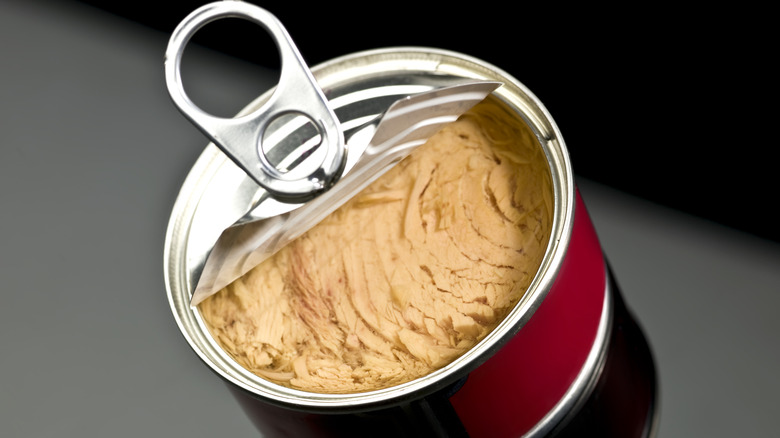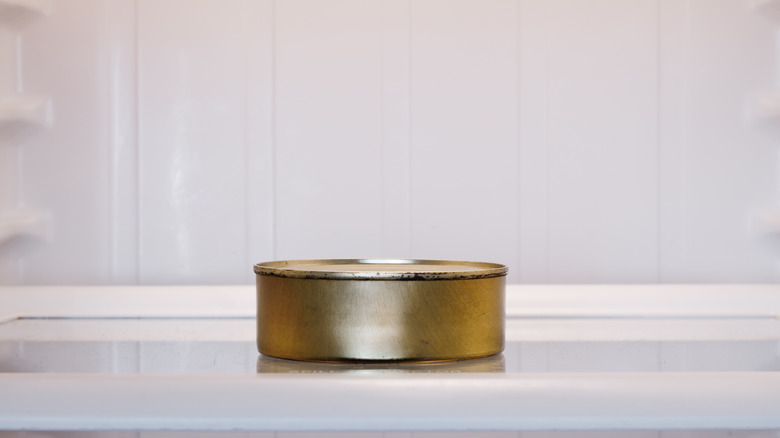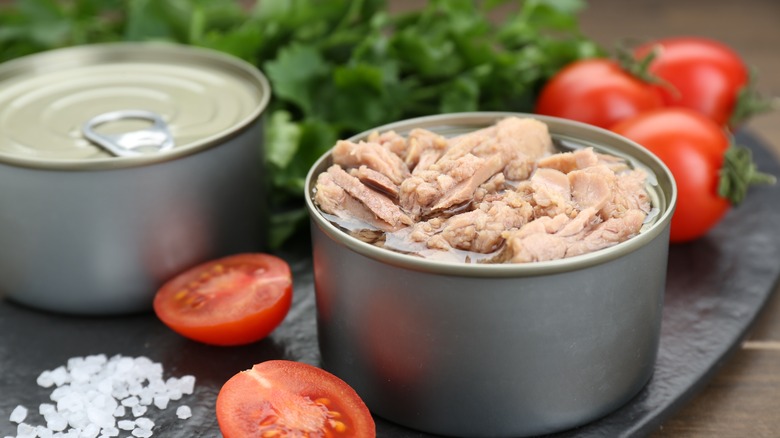The Best Place To Store Your Canned Tuna Isn't In The Pantry
CORRECTION 9/11/24: A previous version of this article stated storing unopened canned tuna in the fridge would extend its shelf life. Unopen cans of shelf-stable products do not spoil more slowly when chilled.
If you love canned tuna, you likely often have a bunch of cans stacked in your pantry. But it might come as a surprise that this isn't actually the best spot to store your beloved fish. Most recipes using canned tuna call for cold or chilled fish, but if you are making a tuna recipe that calls for warm tuna, such as a warm tuna salad or a sheet-pan tuna melt, you may be just fine keeping it stored in the pantry. However, if you're hankering for a cold tuna recipe, such as a canned tuna open-faced sandwich, that means you may have to take the canned tuna out of your pantry and let your tuna get cold in your fridge before you make your meal. Instead of suffering that delay by having to wait for your tuna to cool off, just store a few of your cans in the refrigerator instead so it's already chilled for when the craving strikes.
Ever wonder if canned tuna ever actually goes bad? Well, if your pantry is near your oven or stove, storing canned tuna in your pantry may actually lead to your tuna expiring faster. Warmer temperatures inside the cans make it spoil faster, and your oven or stove can certainly increase the temperature inside your canned tuna if you're cooking too closely to where your cans are stored. To avoid your canned tuna potentially going bad sooner than it should, store it in the refrigerator.
Canned tuna is safer in the refrigerator
If you cook at home a lot, your pantry is probably chock full of items that you use to whip up your homemade meals. You might even stack bulky items on top of your canned tuna just to save space, but this is a bad idea. Weighty items that sit on top of your canned tuna in your pantry can rupture the can, which can lead to the liquid in the can seeping out or substances getting in that can taint the tuna. Instead of stacking cans of tuna in the pantry, store them in the fridge where they are less likely to end up hidden behind — and under — larger objects.
One thing worth noting is you will want to make sure your cans of tuna stay dry. If your fridge is prone to condesation, make sure you check your cans regularly, as you don't want them to get rusty. While you can wipe off the cans if you notice a bit of rust right at the beginning, the longer it's on the can the more likely it is to eat a hole in the product. Even a tiny, pinprick of a hole can allow bacteria to get in and spoil your tuna.
What happens if you store your canned tuna in the freezer
Now that you know what can happen if you store your canned tuna in a pantry or refrigerator, you may be wondering if it is ever a good idea to freeze canned tuna. The good news is that storing your canned tuna in the freezer will sustain its freshness for about three months. However, frozen canned tuna will undergo changes that can impact how you'll be able to use and enjoy it.
When canned tuna is subjected to freezing temperatures, the texture of the tuna can change and it may no longer have the flavor that you're expecting. Since the consistency of the tuna will be different, you may not want to eat the frozen tuna right out of the can because it may have an unpleasant taste. Instead, you might want to solely use your previously frozen canned tuna in recipes that call for you to blend the tuna with other ingredients to add more flavor and texture, which may make the previously frozen fish more edible than it would otherwise be on its own. And the next time you bring home a bunch of canned tuna and you turn to your pantry to store them, remember that there's an alternative storage option that just might be better.


